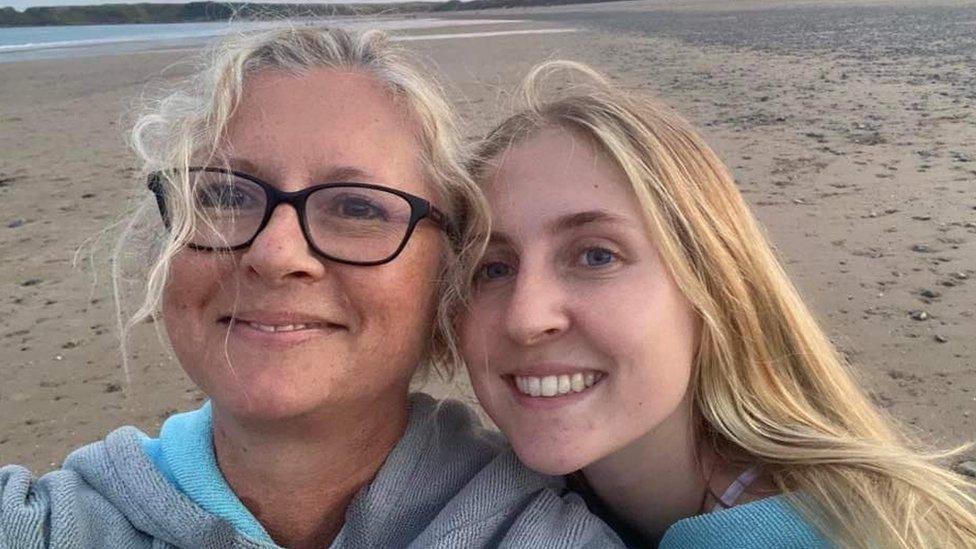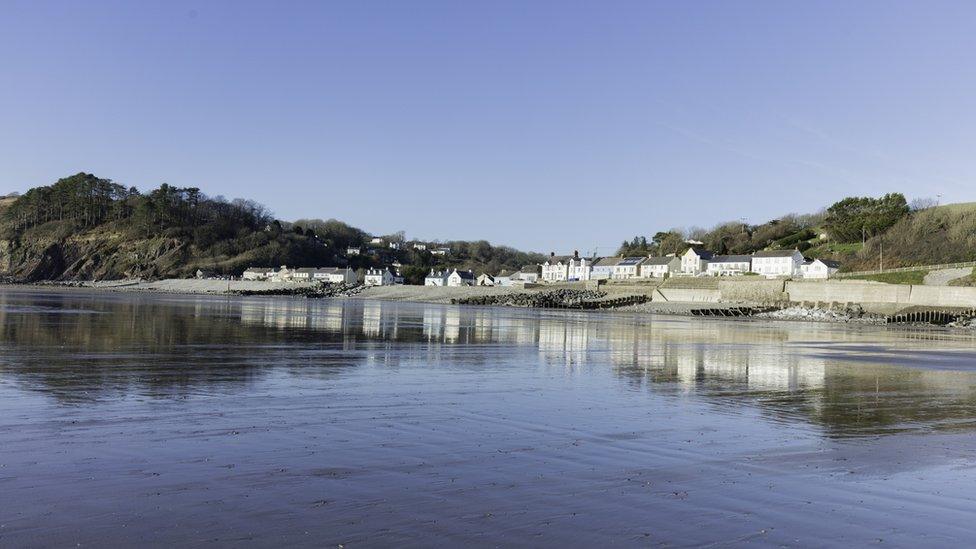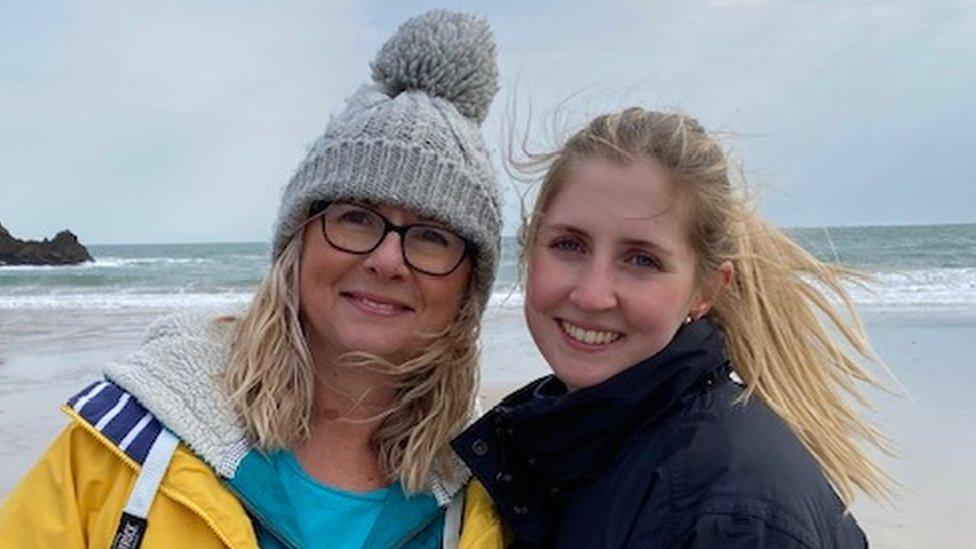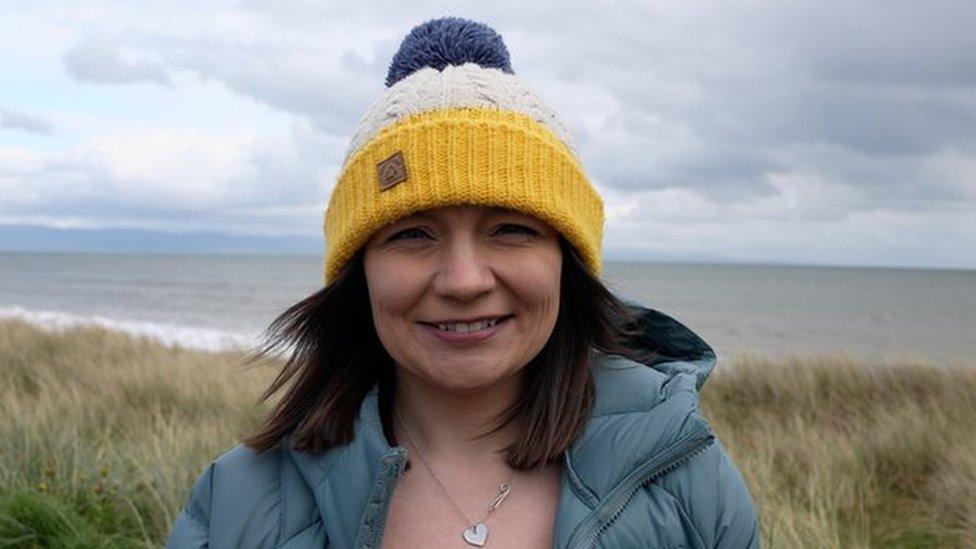Sewage: Mum says daughter got E. coli after swimming in polluted sea
- Published

Jayne Etherington, left, and daughter Caitlin Edwards went swimming at Amroth in Pembrokeshire
A student needed dialysis and blood transfusions after swimming in the sea following a sewage spill, her mum said.
After getting E. coli, Caitlin Edwards developed haemolytic uraemic syndrome (HUS) which damaged her kidneys.
Jayne Etherington said her 22-year-old daughter's "horrendous" five-month ordeal began after she swam in the sea just off west Wales in last summer.
"She'd gone from a happy, healthy, vibrant 22-year-old to looking like she was going to die," mum Jayne said.
Caitlin had gone for a dip at the beach at Amroth in Pembrokeshire, a few miles east of Tenby, and did not know about the untreated sewage spill at Wiseman's Bridge, just down the coast, on 24 August, 2022.
At the time it was reported storm sewage was discharged at four beaches, including Wiseman's Bridge and Saundersfoot, with Welsh Water saying the spill came from combined storm overflows (CSOs).
But Welsh Water said the Wiseman's Bridge spill was from a private source and nothing to do with them.
"We were allowed to believe it was a CSO spill," said Jayne.

Caitlin Edwards did not know there had been an untreated sewage spill when she went swimming in the sea
"No-one said, 'This is something more serious'."
After leaving her home in Pembrokeshire and staying in London with her boyfriend, Caitlin started having stomach cramps and diarrhoea.
After five days, she went to hospital and was diagnosed with E. coli, external and HUS, external.
Her mum said she wasn't called until she was in the resuscitation department.

Amroth beach is a popular spot for both locals and tourists
Jayne said the family "didn't know she wasn't going to die", adding: "It was horrendous."
Jayne said Public Health Wales (PHW) investigated what Caitlin had eaten and found the likeliest cause was untreated sewage as harmful bacteria had entered her intestine.

What is E. Coli?
E coli is a bacteria infection which can be found in the gut and faeces of many animals, especially cattle
Symptoms include diarrhoea, stomach cramps and sometimes fever. About half of those infected will have bloody diarrhoea.
These symptoms are usually noticeable 3 to 4 days after they have been infected, but can start at any time between 1 and 14 days afterwards and can last for up to two weeks.
A small number of people who become infected go on to develop a condition called haemolytic uraemic syndrome which can lead to kidney failure and death.
Source: NHS, external

Caitlin has now made a full recovery, completed her English and Spanish degree and is now working in Canada running children's camps.
PHW said it could not comment on individual cases and Welsh Water said the spill was not down to them.

Caitlin had a pact with her mum for them to swim in the sea together every day before she went back to university
Pembrokeshire council said it had placed warning signs on the beach "acting on information received regarding a pollution incident from Natural Resources Wales".
NRW said its investigation into the Wiseman's Bridge pollution concluded "the effluent discharge was due to a private discharge point failure".
"The owners of the private discharge point acted immediately to resolve the issue as soon as possible," said Nicola Mills of NRW.

Caitlin has since recovered and is now working in Canada running children's camps and plans to extend her stay for the winter ski season
"Our officers have visited the area since and there have been no further concerns witnessed or reported.
"Around the same time there was also an ongoing CSO discharge therefore it was not possible to pinpoint sole responsibility for the failure of bathing water sampling at Wiseman's Bridge."
The organisation said Amroth and Wiseman's Bridge were sampled on the same day.
"Results from those tests showed a failure in water quality at Wiseman's Bridge but not at Amroth," Ms Mills said. "Every discharge outlet has its own permit limits."
Related topics
- Published8 August 2023

- Published26 April 2023

- Published21 January 2022
